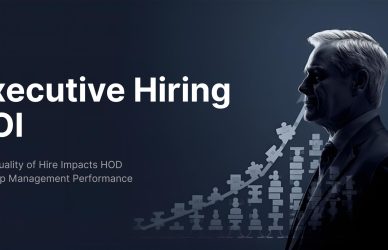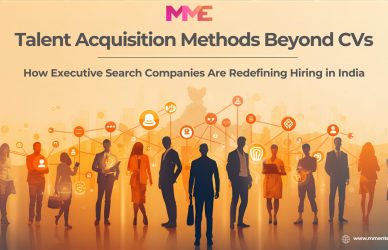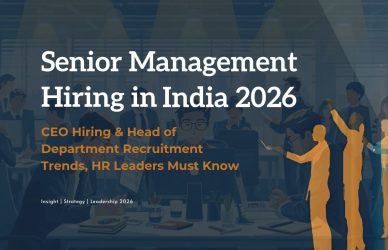Introduction: The Leadership Search Reimagined
The Changing Dynamics of Leadership Needs
The business landscape in 2025 is marked by digital transformation, globalization, remote work models, and economic volatility. These forces have reshaped what it means to lead an organization. Today’s leaders must not only be visionary but also tech-savvy, inclusive, and agile. Companies are no longer searching for just experienced executives—they are searching for strategic thinkers who can anticipate change and respond with resilience.
A crucial component of this evolving definition of leadership is emotional intelligence. Executives must now foster inclusive cultures, navigate hybrid teams, and inspire innovation while maintaining operational excellence. Companies need leaders who can transform disruption into opportunity and align people with purpose.
Why Executive Recruitment Agencies Matter in 2025
Executive recruitment agencies have evolved to meet this new reality. Acting as strategic partners, these agencies go beyond traditional hiring to help organizations build future-ready leadership teams. They blend technology, data, and human insight to deliver not only qualified but transformational talent.
Recruiters today are not just talent finders—they are architects of organizational growth. They assess candidates based on vision alignment, adaptability, and long-term cultural fit. In 2025, working with an executive recruitment agency is not just an option—it’s a competitive advantage that ensures leadership continuity, diversity, and strategic agility.

Evolution of Executive Recruitment: A Brief History
From Traditional Head-Hunting to Digital Platforms
Executive recruitment was once a high-touch, low-tech process driven by personal networks and industry whispers. In the pre-digital era, finding a top-tier executive meant attending industry events, relying on business cards, and scanning printed resumes. It was time-intensive and limited by geography.
With the rise of LinkedIn in the early 2000s, recruiters gained access to a broader candidate pool. However, visibility alone wasn’t enough. Agencies began developing proprietary databases and research techniques to keep pace with growing complexity.
Key Technological Milestones in Recruitment
Between 2015 and 2020, AI-powered resume scanning, algorithmic shortlisting, and video interviews emerged. By 2023, top agencies integrated natural language processing (NLP) to analyze leadership language, tone of voice, and communication styles.
These innovations enabled faster, more accurate candidate matching. Smart tech became a differentiator, empowering recruiters to spend more time on strategy and less on manual sorting.
Impact of Globalization on Executive Hiring
Global expansion and remote work normalized hiring beyond borders. Companies can now target leadership talent in New York, Singapore, or Berlin without relocating them. This has led to the rise of global executive recruitment agencies with expertise in cultural onboarding, visa logistics, and regional compensation.
In 2025, an executive recruitment agency must offer international candidate sourcing, cross-border compliance support, and timezone collaboration planning—making global talent truly accessible.
What Defines an Executive Recruitment Agency in 2025?
Core Competencies of Modern Agencies
A top-tier executive recruitment agency in 2025 is defined by specialization, digital fluency, and strategic insight. These firms operate with:
-
Advanced AI-based talent mapping
-
Deep industry-specific focus
-
Global talent access
-
Consultative recruiting models
They are expected to assess both potential and performance—analyzing leadership presence, resilience, decision-making styles, and business impact.
Beyond Hiring: Strategic Talent Advisory Roles
Modern agencies act more like consulting firms than traditional recruiters. Their offerings include:
-
Succession planning and executive pipeline development
-
Market mapping and leadership benchmarking
-
Cultural assessment and role alignment
-
Employer branding for leadership roles
By doing more than just sourcing candidates, these agencies enable companies to align their executive team with long-term business vision and values.
Technology Transforming Executive Search
AI-Driven Candidate Discovery and Engagement
AI now helps recruiters look beyond resumes. Machine learning tools analyze executive speeches, industry publications, social media, and public records to uncover potential candidates. AI flags high performers—even passive ones—who may not be actively seeking new roles.
Predictive Analytics and Talent Scoring Models
Agencies now use predictive analytics to measure future-fit. Scoring models consider:
-
Leadership trajectory and versatility
-
Crisis performance indicators
-
Change management history
-
Alignment with company mission
This allows firms to make data-driven, forward-looking hiring decisions instead of relying solely on past experience.
Immersive Hiring Through Virtual Reality
VR brings immersive experience into the hiring process. Candidates virtually interact with leadership teams, simulate real-time challenges, and tour company environments. This results in more informed decisions on both ends—employer and candidate.
Data Security and Blockchain in Executive Vetting
Blockchain verifies educational, professional, and certification records securely and instantly. It protects sensitive candidate data and ensures trust through tamper-proof validation—reducing fraud and administrative lag.
Balancing AI and Human Insight
While technology enables scale and precision, human intuition is still essential. Recruiters bring emotional intelligence, negotiation skill, and vision matching into the process—ensuring the final decision feels right, not just looks right on paper.
Executive Talent Trends in 2025
Fractional Executives and Agile Leadership
Firms increasingly rely on fractional CXOs—experienced leaders who take on executive roles part-time or for fixed durations. These agile leaders are ideal for scaling businesses or navigating transformation projects.
Skills for Leading Remote and Hybrid Teams
Executives must now master asynchronous workflows, digital leadership, and culture-building without physical presence. Executive recruitment agencies assess candidates on their fluency with tools, remote communication style, and ability to inspire distributed teams.
Diversity, Equity, and Inclusion in C-Suite Roles
Boards are pushing for diverse leadership. Recruitment firms are expected to deliver diverse slates while using inclusive evaluation practices. DEI is not a side benefit—it’s a hiring mandate.
Sustainability and ESG-Driven Talent Demand
Companies are recruiting CSOs and ESG-focused executives to address investor expectations and climate mandates. Recruitment agencies maintain curated pipelines of talent with expertise in ESG reporting, carbon strategy, and sustainability innovation.
Top Sectors Benefiting from Executive Recruitment in 2025
Technology and Software
CTOs and Chief Product Officers are being recruited to scale AI, manage cybersecurity threats, and align roadmaps with evolving user needs.
Healthcare and Life Sciences
Roles like Chief Innovation Officer and Chief Medical Information Officer are in demand as companies transform care delivery with digital tools.
Finance and Fintech
Recruiters place CFOs, CROs, and regulatory specialists to help fintechs manage growth, compliance, and innovation simultaneously.
Green Economy and Renewable Energy
Executive roles are emerging around ESG strategy, green financing, and clean energy transition. CSOs are becoming a standard C-suite position.
Manufacturing and Supply Chain
Industry 4.0 adoption is creating demand for digitally fluent COOs and supply chain leaders experienced in automation and AI-driven logistics.

Choosing the Right Executive Recruitment Agency
Evaluating Industry Experience and Reach
Not all executive recruitment agencies are created equal. In 2025, the best firms demonstrate deep vertical specialization. Whether in healthcare, energy, fintech, or manufacturing, sector experience gives recruiters the insight to assess both current trends and future leadership needs.
Additionally, global reach is essential. An executive recruitment agency in 2025 should offer cross-border access to talent and expertise in navigating cultural expectations, work visas, tax implications, and remote onboarding.
Tech Capabilities and Innovation Focus
Modern agencies must integrate advanced technologies into their processes. Look for:
-
AI-powered talent mapping tools
-
Predictive hiring models that assess future performance
-
Blockchain for credential verification
-
DEI-enhanced shortlisting systems
These innovations allow recruiters to deliver better candidate matches faster and with greater transparency. An agency’s commitment to innovation directly reflects its ability to meet your evolving talent needs.
Building Long-Term Talent Partnerships
The best results come from strategic partnerships, not one-time transactions. Leading agencies offer:
-
Leadership succession planning
-
Talent pipeline development
-
Regular leadership market insights
-
Executive coaching and onboarding assistance
A long-term engagement ensures consistency, cultural alignment, and faster turnaround in future hiring needs. It transforms the recruiter into an extension of your internal leadership team.
Avoiding Common Pitfalls in Agency Selection
Red flags to avoid include:
-
Vague timelines with no milestones
-
One-size-fits-all candidate pipelines
-
Poor DEI representation in shortlists
-
Minimal post-placement follow-up
Also, beware of agencies that prioritize speed over fit. True executive success depends on a careful match, which requires in-depth consultation, stakeholder involvement, and strategic evaluation.
Case Studies: Executive Recruitment in Action
Fintech Expansion
A Southeast Asian fintech firm secured a US-based CFO through an agency, boosting Series D funding and global compliance readiness. The CFO, experienced in IPO strategy and financial restructuring, revamped financial reporting, negotiated cross-border investments, and scaled financial controls to support rapid growth.
Healthcare Transformation
A German hospital system revamped its digital patient experience with a tech-first CMO. Within 12 months, the new leader launched a virtual care platform, redesigned the patient journey, and increased digital engagement by 300%. Patient satisfaction and online reputation saw dramatic improvement.
ESG Manufacturing Leadership
A European industrial company hired a Chief Sustainability Officer with global ESG experience. The CSO led initiatives in supply chain decarbonization, improved compliance reporting, and helped secure €30 million in green investment. ESG ratings rose significantly, boosting shareholder confidence.
Challenges Facing Executive Recruitment Agencies in 2025
Talent Scarcity and Rising Expectations
There is a growing demand for leaders who are strategic, tech-savvy, emotionally intelligent, and diverse. However, the supply of such candidates is limited. Agencies are under pressure to deliver quickly while ensuring cultural fit, diversity, and succession readiness.
AI Ethics and Recruitment Transparency
As AI becomes central to sourcing and shortlisting, questions arise around fairness, bias, and transparency. Agencies now use explainable AI, conduct fairness audits, and ensure human oversight in hiring decisions to meet ethical and regulatory standards.
Candidate Ghosting and Offer Competition
Executive-level ghosting is increasingly common, with candidates dropping out mid-process for more attractive opportunities. Agencies invest in candidate engagement platforms, personalized communication, and values alignment early in the process to prevent drop-offs.
Navigating Global Hiring Compliance
International hiring requires knowledge of visa regulations, tax laws, remote work mandates, and data privacy regulations like GDPR. Recruitment agencies must offer legal advisory capabilities or risk exposing clients to compliance violations.

Conclusion: Future-Proofing with an Executive Recruitment Agency in 2025
Strategic Partnerships with Executive Search Firms
In 2025, executive recruitment agencies are not just service providers—they are strategic growth partners. They help shape long-term leadership strategy by identifying future-ready talent and supporting succession planning, cultural transformation, and ESG integration. Businesses now expect their recruitment partners to co-create solutions, anticipate challenges, and build leadership capital that aligns with evolving market realities.
The best agencies are embedded in their clients’ long-term vision. They participate in board discussions, advise on emerging leadership roles, and even help redefine what effective leadership looks like in a world marked by disruption and innovation.
Long-Term Value Creation Through Smart Hiring
A wrong executive hire can cost a company millions—not just in salary, but in lost opportunities, damaged culture, and poor strategic execution. In contrast, a well-placed leader can inspire growth, elevate brand reputation, and future-proof operations.
Modern executive recruitment agencies mitigate hiring risks through:
-
Predictive analytics and culture-fit modeling
-
DEI-aligned shortlisting and leadership assessments
-
360-degree reference verification and succession planning
Moreover, these agencies don’t disappear after placement. They often offer post-placement coaching, onboarding roadmaps, and performance monitoring—ensuring long-term alignment and value realization.
Why Leadership Talent Is a Business Imperative
In an age defined by constant change, innovation, and accountability, businesses live or die by the strength of their leadership. Whether it’s navigating digital transformation, scaling sustainably, or maintaining a strong brand through crises, the executive team is the deciding factor.
Leadership is no longer just about command—it’s about adaptability, purpose, and vision. The executive recruitment agency in 2025 is uniquely equipped to help organizations discover leaders who can thrive in complexity, inspire diverse teams, and create lasting impact.
Companies that embrace this new model of strategic recruitment position themselves not just for survival—but for sustainable growth and competitive leadership in the global arena.










